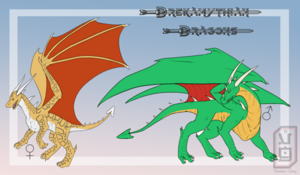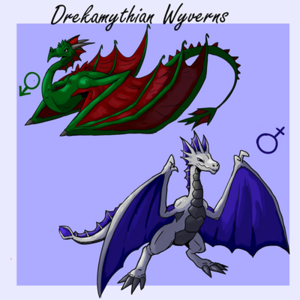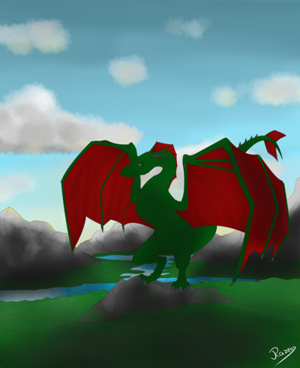Biodiversity in Anagonia: Difference between revisions
No edit summary |
No edit summary |
||
| Line 4: | Line 4: | ||
=== Marine Life === | === Marine Life === | ||
The Magnus Draco Oceanum, often referred to as the Great Dragon Ocean, serves as a thriving habitat for a multitude of marine species. Its pristine waters are teeming with vibrant coral reefs, vast kelp forests, and bustling seagrass meadows. Among the remarkable marine fauna found in these waters are the majestic Blue Whales, colossal creatures known for their imposing size and enigmatic behaviors. Additionally, Anagonia is home to an extensive array of fish species, including the iridescent | The Magnus Draco Oceanum, often referred to as the Great Dragon Ocean, serves as a thriving habitat for a multitude of marine species. Its pristine waters are teeming with vibrant coral reefs, vast kelp forests, and bustling seagrass meadows. Among the remarkable marine fauna found in these waters are the majestic Blue Whales, colossal creatures known for their imposing size and enigmatic behaviors. Additionally, Anagonia is home to an extensive array of fish species, including the iridescent {{wpl|Neon Tetras}} and the elusive {{wpl|Pelican Eel}}, which inhabit the ocean's depths. | ||
=== Terrestrial Wildlife === | === Terrestrial Wildlife === | ||
The mainland of Anagonia, spanning across the continents of Minor Kistavich and Major Kistavich, harbors a diverse range of terrestrial ecosystems. From dense temperate forests to sprawling grasslands, the landscape supports a rich variety of wildlife. Among the iconic terrestrial species found in Anagonia are the majestic Moose, towering herbivores known for their impressive antlers and graceful demeanor. Other notable inhabitants include the elusive | The mainland of Anagonia, spanning across the continents of Minor Kistavich and Major Kistavich, harbors a diverse range of terrestrial ecosystems. From dense temperate forests to sprawling grasslands, the landscape supports a rich variety of wildlife. Among the iconic terrestrial species found in Anagonia are the majestic Moose, towering herbivores known for their impressive antlers and graceful demeanor. Other notable inhabitants include the elusive {{wpl|Snow Leopards}}, stealthy predators that roam the forests with unmatched agility. Additionally, the skies above Anagonia are frequented by a myriad of avian species, such as the vibrant {{wpl|Northern Cardinals}} and the graceful {{wpl|Red-tailed hawk}}. This abundance of wildlife makes Anagonia's mainland a sanctuary for a breathtaking array of terrestrial life, from the towering forests to the expansive grasslands. Among the most revered inhabitants are the legendary Drekamythian Dragons, ancient beings whose lineage dates back millions of years to a time when continents shifted and dragons soared the skies. The modern-day Drekamythian Dragon, scientifically known as Draconus Drekamythus Imperius, embodies both mystery and majesty as it glides with effortless grace through the currents of air that sweep across Anagonia's landscapes. | ||
=== Drekamythian Dragons === | === Drekamythian Dragons === | ||
| Line 17: | Line 17: | ||
=== Avian Life === | === Avian Life === | ||
Anagonia's skies are alive with the graceful flight of countless avian species. From majestic birds of prey to colorful songbirds, the nation boasts a diverse avifauna that reflects its varied habitats. Among the notable avian residents are the magnificent | Anagonia's skies are alive with the graceful flight of countless avian species. From majestic birds of prey to colorful songbirds, the nation boasts a diverse avifauna that reflects its varied habitats. Among the notable avian residents are the magnificent {{wpl|Bald Eagles}}, renowned for their striking plumage and formidable hunting prowess. Additionally, the skies are graced by the elegant Swallows, known for their exceptional agility and aerial acrobatics. The coastal regions of Anagonia also serve as important nesting grounds for seabirds, including the iconic {{wpl|Puffin}} and the charismatic {{wpl|Pelicans}}. | ||
=== Drekamythian Wyverns === | === Drekamythian Wyverns === | ||
| Line 26: | Line 26: | ||
=== Insect Life === | === Insect Life === | ||
Anagonia's diverse ecosystems are also home to a plethora of insect species, playing crucial roles in pollination, decomposition, and nutrient cycling. From the bustling colonies of industrious | Anagonia's diverse ecosystems are also home to a plethora of insect species, playing crucial roles in pollination, decomposition, and nutrient cycling. From the bustling colonies of industrious {{wpl|Ants}} to the delicate iridescence of {{wpl|Dragonflies}}, the nation's insect fauna is as varied as it is fascinating. Among the notable insect species found in Anagonia are the ethereal {{wpl|Luna Moth}}, renowned for their striking lunar-like markings and nocturnal habits. Additionally, the vibrant colors of {{wpl|Wildflowers}} attract a diverse array of butterfly species, contributing to the region's ecological vibrancy. | ||
Revision as of 00:05, 22 April 2024
This article is incomplete because it is pending further input from participants, or it is a work-in-progress by one author. Please comment on this article's talk page to share your input, comments and questions. Note: To contribute to this article, you may need to seek help from the author(s) of this page. |
Anagonia boasts a rich tapestry of biodiversity across its vast expanse, encompassing diverse ecosystems that range from its mainland to the surrounding Magnus Draco Oceanum. The unique geography and climatic variations of the region have fostered the evolution of a wide array of marine, terrestrial, and avian life forms.
Marine Life
The Magnus Draco Oceanum, often referred to as the Great Dragon Ocean, serves as a thriving habitat for a multitude of marine species. Its pristine waters are teeming with vibrant coral reefs, vast kelp forests, and bustling seagrass meadows. Among the remarkable marine fauna found in these waters are the majestic Blue Whales, colossal creatures known for their imposing size and enigmatic behaviors. Additionally, Anagonia is home to an extensive array of fish species, including the iridescent Neon Tetras and the elusive Pelican Eel, which inhabit the ocean's depths.
Terrestrial Wildlife
The mainland of Anagonia, spanning across the continents of Minor Kistavich and Major Kistavich, harbors a diverse range of terrestrial ecosystems. From dense temperate forests to sprawling grasslands, the landscape supports a rich variety of wildlife. Among the iconic terrestrial species found in Anagonia are the majestic Moose, towering herbivores known for their impressive antlers and graceful demeanor. Other notable inhabitants include the elusive Snow Leopards, stealthy predators that roam the forests with unmatched agility. Additionally, the skies above Anagonia are frequented by a myriad of avian species, such as the vibrant Northern Cardinals and the graceful Red-tailed hawk. This abundance of wildlife makes Anagonia's mainland a sanctuary for a breathtaking array of terrestrial life, from the towering forests to the expansive grasslands. Among the most revered inhabitants are the legendary Drekamythian Dragons, ancient beings whose lineage dates back millions of years to a time when continents shifted and dragons soared the skies. The modern-day Drekamythian Dragon, scientifically known as Draconus Drekamythus Imperius, embodies both mystery and majesty as it glides with effortless grace through the currents of air that sweep across Anagonia's landscapes.
Drekamythian Dragons
With their awe-inspiring presence, Drekamythian Dragons stand as symbols of Anagonia's enduring connection to its ancient past. These magnificent creatures exhibit striking sexual dimorphism, with males commanding attention with their larger size and assertive demeanor. Standing at an impressive 63 feet in length and towering 14 feet in height, male Drekamythian Dragons fiercely guard their territories and the sacred spaces within mountain caves where they safeguard their precious eggs. In contrast, the slightly smaller females, measuring around 43 feet in length and 9 feet in height, possess a more gentle disposition, often engaging in curious interactions with humans who venture into their domain. Despite their elusive nature, these dragons have woven themselves into the fabric of Anagonian lore, drawing pilgrims from far and wide to witness their magnificence and partake in the mystical connections they inspire.
Avian Life
Anagonia's skies are alive with the graceful flight of countless avian species. From majestic birds of prey to colorful songbirds, the nation boasts a diverse avifauna that reflects its varied habitats. Among the notable avian residents are the magnificent Bald Eagles, renowned for their striking plumage and formidable hunting prowess. Additionally, the skies are graced by the elegant Swallows, known for their exceptional agility and aerial acrobatics. The coastal regions of Anagonia also serve as important nesting grounds for seabirds, including the iconic Puffin and the charismatic Pelicans.
Drekamythian Wyverns
In the boundless skies above Anagonia, another winged wonder graces the heavens—the Drekamythian Wyvern. These enigmatic creatures, reminiscent of their dragon kin yet distinct in their own right, call the high mountains and coastal cliffs of the mainland home. Among their kind, the Green Mountain Wyverns reign supreme, their sleek forms effortlessly navigating the rugged peaks that pierce the clouds. Meanwhile, the Coastal Ocean Wyverns, with their streamlined bodies and powerful wings, patrol the rocky shores and pristine beaches with an elegance that mirrors the rhythmic ebb and flow of the tides. While sharing lineage with the legendary Drekamythian Dragons, wyverns carve out their own niche within Anagonia's ecological tapestry, serving as guardians of the skies and symbols of the untamed beauty that defines the nation's wild heart.
Insect Life
Anagonia's diverse ecosystems are also home to a plethora of insect species, playing crucial roles in pollination, decomposition, and nutrient cycling. From the bustling colonies of industrious Ants to the delicate iridescence of Dragonflies, the nation's insect fauna is as varied as it is fascinating. Among the notable insect species found in Anagonia are the ethereal Luna Moth, renowned for their striking lunar-like markings and nocturnal habits. Additionally, the vibrant colors of Wildflowers attract a diverse array of butterfly species, contributing to the region's ecological vibrancy.



